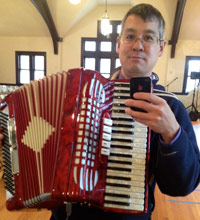|
Here’s Dave Carter with Tracy Grammer from 2002, singing a song he had just written at the Sisters Folk Festival in Sisters, Oregon.
“Gentle Arms of Eden,” live on stage. This song may be the duo’s best known and has been incorporated into at least one Unitarian Universalist hymnal. It’s hard to write about Carter without starting at the end. On the morning of July 19, 2002 in Hadley, MA, Carter went out for a run. When he returned to the hotel, he suffered a heart attack. Tracy wrote their fans in an open letter on their website:
Dave Carter was 49 years old. It doesn’t embed here, but there is a nice 2002 interview with the couple (and they were a couple, as well as a duo) from ArtsBeat Oregon from Oregon Public Broadcasting here. More background on Dave and Tracy can be found in a review and interview by David Bulla in the Music Matters Review. Some highlights from that story: Carter describes his parents: steeped in math and science and also touched by the Holy Spirit and evangelism. Dave eventually made his way to Portland, OR to study math there. He worked as a computer programmer and mathematician before turning to folk music in his 40s. Meanwhile, Grammer studied English and anthropology at UC Berkeley:
Carter cites a number of songwriting heroes, including Joni Mitchell, the Beatles’ psychedelic period and the Dukes of Stratosphear (an XTC project to produce records in the late 1960s psychedelic pop style), as well as “Leonard Cohen, Emmylou Harris, Sean Colvin, Buck Owens, Miles Davis, Dwight Yokum, Steve Earle, Townes Van Zandt, Guy Clark, Duke Ellington, George Gershwin and Waylon Jennings.” Grammer described meeting Carter in Portland:
Carter on songwriting:
Joyce Marcel, a writer and fan, wrote an obituary for Carter (and Alan Lomax, who died the same day) in which she contemplated the recipe of Carter’s songwriting:
A week after Carter’s death, the duo were scheduled to perform at the Falcon Ridge Folk Festival. Tracy Grammer went alone. From a review by Jennifer Hanson in Rambles:
In place of Dave and Tracy’s set, Grammer sang Carter’s “The Mountain” to open a series of performances of Carter’s songs. She closed with “Gentle Soldier of My Soul.”
Tracy Grammer continues to perform Dave Carter’s songs and has released music they had recorded before his untimely death. As a duo, they had always performed Carter’s songs. After his passing, Grammer wrote her first original composition, a eulogy for Carter called “The Verdant Mile”:
At Falcon Ridge on the 10th anniversary of Dave Carter’s death: [Bonus for Grammer and NFS fans: you can find her cover of Carole King's "Wasn't Born to Follow" on Spotify]
0 Comments
The Indigo Girls, Emily Saliers and Amy Ray, each write individually, although they have performed together since they were teenagers. Closer To Fine, their biggest early hit, was written by Saliers. In an interview with the website Songfacts.com, she spoke about the song:
The Indigo Girls were nominated for a best new artist Grammy following the release of their self-titled, second album which contained “Closer to Fine.” They lost that Grammy to… guesses? Milli Vanilli. Harsh. Their recording of the song featured members of the Irish band Hothouse Flowers (on mandolin, tin whistle, bodhran and backing vocals). You might remember Hothouse Flowers’ song “Don’t Go”: The song also featured backing vocals from Luka Bloom (Christy Moore’s younger brother), a great songwriter and performer in his own right. The Girls must have been in some sort of Irish phase. I learned how to play guitar around the time “Closer To Fine” came out and it was one of those songs that people passed along because the chords are just a little bit different from standard but if you master them, you sound just like the record. (Or so we told ourselves.) In particular, this was a moment when the C9 chord was huge. Learn this chord and it seemed like you could play a whole bunch of songs.
Just on acoustic guitar, you hear C9 on “Closer To Fine” (1989) and Guns n Roses’ “Patience” (1989) and the same chord shape is used in Lyle Lovett’s “If I Had a Boat” (1987) and Oasis’ “Wonderwall” (1995). On electric, you can hear it on “Welcome to the Jungle” (1987) (Izzy Stradlin’ must like this chord) and the GoGos’ “Head Over Heels (1984).
Once you master that C9 — and figure out the strumming pattern — “Closer To Fine” sounds great. There aren’t too many oddball covers of the song, but here’s a small selection of other versions: “Closer To Fine” with male voices, from two guys from Sister Hazel A punk version:
The Indigo Girls play “Closer To Fine” at every concert (fans might not go home until they do). They claim they are not tired of doing the song, in part because they invite their opening act, audience members or other guests to sing along so it’s always a little different. So here’s… sigh… a version with ADA Claire Kincaid — I mean, actress (and former Toronto busker) Jill Hennesy: For some reason Jill keeps giving the satan salute. Not sure if I like her more or less because of it. |
AuthorJack Cheng directs the Clemente Course in Dorchester, excavates in the Middle East, and writes in Waban, MA. Archives
October 2019
Categories |



 RSS Feed
RSS Feed
